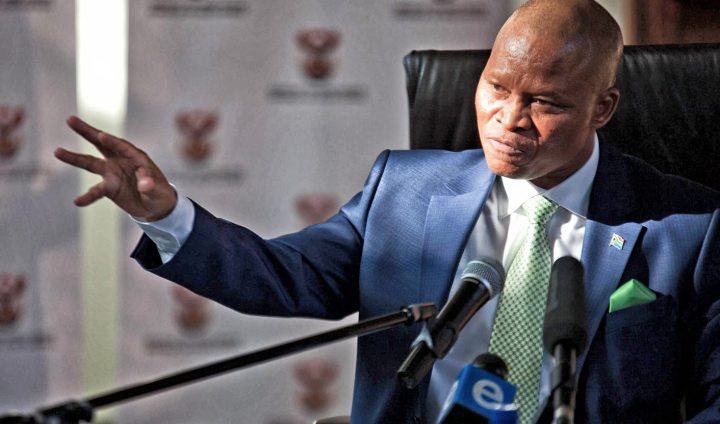South Africa
Mogoeng: Fake Democracy vs Judicial Independence

It’s “fake democracy” when the judiciary is considered merely incidental to the state, but judges must do their bit to uphold judicial independence and not corrupt facts and truth. That was Chief Justice Mogoeng Mogoeng’s blunt opening message to the fourth Congress of the Conference of Constitutional Jurisdictions of Africa (CCJA) in Cape Town this week. It’s a complicated dynamic. “Our independence requires we be alive that there’s a possibility of it being corrupted by foreign interests, by warlords and modern-day dictators,” said the county’s top judge. By MARIANNE MERTEN.
Threats come from governments, but also business and other interests, Chief Justice Mogoeng Mogoeng told the fourth Congress of the Conference of Constitutional Jurisdictions of Africa. Much of judicial independence is tied to being a “woman or man of integrity” and upholding the judge’s oath of office beyond a ritualistic exercise, even in the face of challenges.
While the rhetoric of the governing ANC on the judiciary may at times be rough, and losing parties are wont to complain, the chief justice said the judiciary was doing its job in South Africa’s constitutional democracy.
“Nobody has the capacity to pressurise the judiciary. Everybody can try, but our track record has demonstrated we withstand pressure wherever it comes from,” Chief Justice Mogoeng Mogoeng told journalists on the sidelines of the conference.
“We are always very careful not to overstep the mark and we are well trained that this does not happen,” the chief justice said, adding later: “It is inappropriate for me to project the judiciary as the only institution that plays a role in rooting out corruption. We all play a role.”
In South Africa the recent theft of computers with judges’ personal information, still shrouded in suspicion and mystery, is widely seen as an attack on the judiciary. Elsewhere, it’s a lot tougher. During his opening address, Mogoeng recounted being told during a visit to Ghana, West Africa, that “judges are short-lived… their bodies were picked up at the river”.
But judges knew the risks, he added. “If you have to die (for freedom) so be it, rather than corrupt yourself… It is important no one can tell a judge what to do because of position or power.”
The Congress of the Conference of Constitutional Jurisdictions of Africa (CCJA) was formed in 2011 as an independent institution to ensure the judiciary of each member state deepens democracy by upholding their constitution and the rule of law, but also as a platform for judges from Africa to exchange views and experiences, but also share lessons with jurisdictions outside the continent.
This week’s conference brings together some 200 judges from across the continent, but also from Europe, Indonesia and Brazil. It’s a wide-ranging mix of judicial officers, including those from countries that jail citizens for insulting the president, or journalists.
The CCJA’s aim is to cement ties and, by inviting potential new members like Botswana, to bring more countries into the fold. “Some come up with strange decisions… Coming into the fold has a shaming effect when colleagues talk passionately about credibility and independence and integrity. Slowly but surely, we are confident people will turn around,” said Mogoeng. The CCJA was a way to expose them to what other jurisdictions were doing, discussions, considerations and practices – and to achieve credible constitutions.
And so reflection, discussion and assistance emerged as keywords in the opening session, alongside threats and factors other than the law.
“We can help each other to help face the threats against the constitutional courts and the rule of law (so) we make our decisions on no other factors affecting us except judicial discretion,” said Guinea-Bissau’s Supreme Court of Justice President Paulo Sanha during Monday’s opening session. Or as the Council of Europe’s Venice Commission President Gianni Buquicchio put it: “When other state bodies publicly attack a constitutional court, its independence and neutrality are put at risk… Our discussions are important.”
Discussions will touch on political instability, separation of powers, criteria to promote judicial independence, judicial accountability and the modernisation of courts. The delegates represent vastly different systems of law from French and English-speaking West Africa, the Arabic-influenced North Africa to southern Africa.
Some of the key ingredients for judicial independence apply across the board: remuneration significant enough so judges are not distracted by “issues of the stomach” and non-renewable long terms of office so judges do not have to worry about self-censorship and pleasing the political functionaries who are in charge of renewing employment.
When judges gather it’s a different affair, say, to politicians, who often quite readily display their power, influence and quick wit. Judges tend to be more inclined towards gravitas, and a quiet collegial word.
Yet the conference was spook-vetted with uniformed police in bullet-proof vests and plenty of bodyguards, while a command and control team ensured smooth operations. What didn’t quite go down smoothly was the X-ray drill of handing over cellphones, small change and keys before going through the machine. The control point lit up like a red robot as one after another passed through unhindered.
And bringing together judges from very different countries produces some interesting results. So a typical South African “Malibongwe igama lamakhosikazi [Praise the name of women]”, usually said in recognition of women playing an important role in public life, fell somewhat flat. Keynote speaker, Gabon’s Constitutional Court President and outgoing CCJA President, Marie Madeleine Mborantsuo, responded: “We’re only judges on a mission… Thank you for promoting women, but in my country we only have judges.” DM
Photo: Chief Justice Mogoeng Mogoeng (Greg Nicolson)

















 Become an Insider
Become an Insider